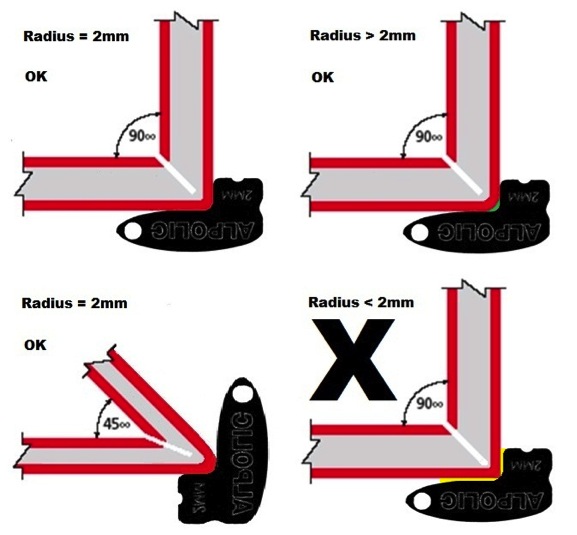

Eliminate Guesswork With ALPOLIC Radius Gauge
Almost all solid materials, including cured paints, have a measurable degree of ductility, which is the ability to sustain a change in shape. Aluminum, such as used on our painted MCM/ACM panels, is highly ductile and can be bent at a relatively sharp angle.
The fluoropolymer-based paints we apply to our panels are chosen for their exceptional durability and weather-resistance. If the bend is within the paint manufacturer’s specifications, it will retain the same integrity as it has on the flat surface of the panel.
Paint manufacturers rate paint’s bending flexibility by the “T-bend test” (ASTM D4145 –see diagram below). Samples of painted metal are bent repeatedly back on themselves, similar to folding a napkin, and the painted edges are examined for film integrity. When the metal is bent upon itself three times – so that there are two inner layers of the metal separating the outer layers produced by the final bend – the result is a “two-T” radius. The fluoropolymer-based paints we used are rated to withstand a two-T bend.

For fabricators, a reliable way to ensure that bends meet or exceed the two-T standard is to always maintain an outside radius of 2mm or greater. Any ALPOLIC® panel bent at an outside radius tighter than 2mm is not covered under our warranty.
The challenge of fabricating bends consistently within the specification
In the past, painted panel manufacturers have recommended specific routing bit angles, flat widths and routing depths, all intended to ensure a two-T or greater radius when the material is bent. We continue to provide these guidelines in our fabrication manuals and our latest technical bulletin on bending ALPOLIC® panels. In addition to fabrication guidelines, what’s needed is a reliable way to assess the actual radius of the bend. Whatever formulas, tools and procedures you use to produce the correct bend, the best way to ensure the integrity of the paint is to directly measure the bend to verify a radius of 2mm or greater.
High-quality radius gauges are available, but they’re prohibitively expensive when you only need the 2mm gauge and not the entire set. They’re also designed for general-purpose use – not optimized for gauging bends in architectural panels.
We’ve got the solution
Our new ALPOLIC® radius gauge is the industry’s first tool specifically designed to ensure that fabricated bends meet our ≥ 2mm specification. It’s precision-tooled of rigid stainless steel – designed to make your job easier and help improve your production quality every day.

Simply place the inner, radiused part of the gauge directly against the bend in the panel, with the flats of the gauge along the flat sides of the panel. For a 90° bend, the flat sides of the panel should fit snuggly into flats of the gauge. If this is not the case, and you can rock the gauge back and forth slightly without touching both panel sides at once, the radius of this bend is smaller than 2mm, which means cracking of the paint could eventually occur.
If the gauge fits perfectly, the bend radius is 2mm, and we warrant the paint against cracking. If there’s a gap at the bend while both flats of the gauge are flush against the panel sides, the radius is larger than 2mm – and of course our warranty applies for bend radiuses larger than 2mm as well.
Once you understand how the gauge works, it’s also easy to verify the bend radius for bends tighter than 90°. It’s simply a matter of observing how well the radius of the bend fits the radius of the gauge. For bends under 90°, we’ve provided 2mm cutouts on the outer edges of the gauge that can be used to evaluate the bend radius.
While it’s still important to pay close attention to routing depths and widths, we believe the new ALPOLIC® radius gauge finally provides a definitive answer to whether the fabrication process is producing bends that meet the paint specification. That’s an answer every fabricator can use.
Learn more
For more information about proper bending and the ALPOLIC® radius gauge, contact your regional representative for ALPOLIC® materials.


